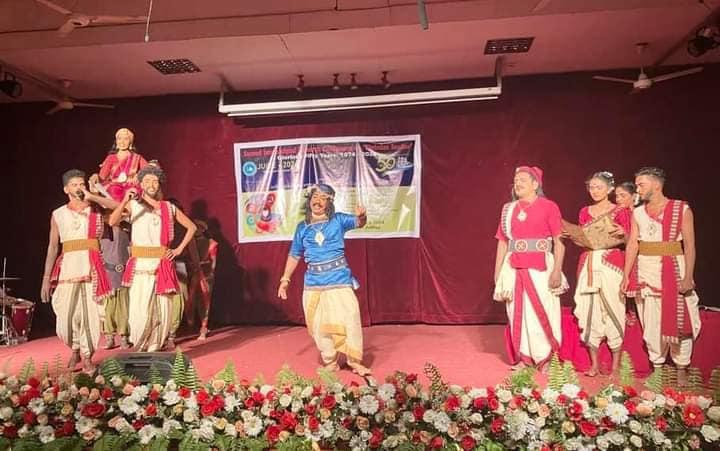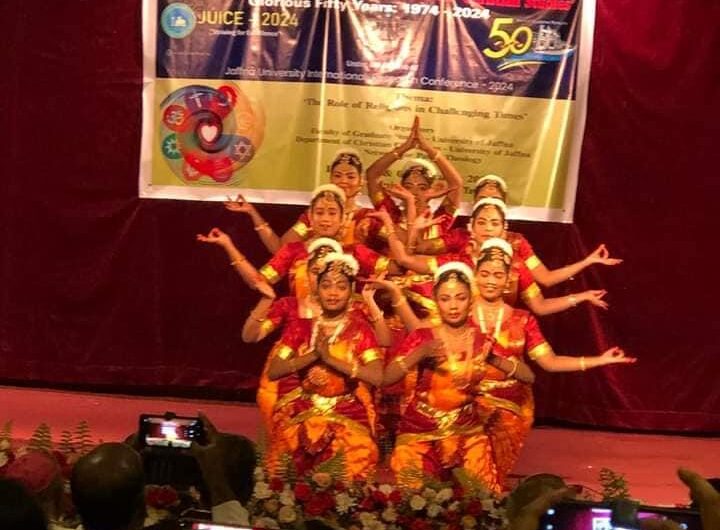The Second International Research Conference on Christian Studies at the University of Jaffna, organized by the Faculty of Graduate Studies and the Department of Christian Civilization of the University of Jaffna in collaboration with the Asian Network of Public Theology was held on the 01st and 02nd of February 2024. The 194th Faculty Board of the Faculty of Graduate Studies and the 479th Senate of the University of Jaffna approved the proposal to have the conference. The conference reflected broadly upon the theme of doing public theology in Asia and with a focused theme on the ‘role of religions in challenging times”. About 350 research scholars and students participated and 75 researchers presented papers on various sub-themes of the conference.

The conference began with a grand inaugural function where the Chair, Co-chairs, Chief Guest and Special Guests along with different dignitaries spoke on the relevance of the theme and expressed their wishes for the success of the conference. The cultural programme ‘Chempaththal’ ( ), a folk-drama which was performed by Thirumarai Kalamantram made a real impact upon the participants. The performance of actors was marked by excellence and fine communication. The conference played a pivotal role in honouring the ‘Glorious Golden Jubilee’ of the University of Jaffna which originated as a campus in 1974. It has become to be recorded in the history of the Faculty of Graduate Studies of the University of Jaffna as the first conference organized and accomplished in its 15 years of existence. At the same time it is the second conference in the series organized and accomplished by the Department of Christian Civilization – the first one was in 2018 and the second in 2024.
Aim:
The aim of the conference was designated to articulate the social responsibility of all religions as significant role players in challenging times for humanity. Christianity has indeed been in the Asian context in the different domains associated with public life and common good of all the people without any discrimination. The Second International Research Conference on Christian Studies, therefore, aimed to provide a platform to document with scientific and methodical research the efforts of Christianity which, among other things had indeed played a significant role in nurturing the rudiments of democracy and upliftment of the social and economic conditions in Sri Lanka as well as in different countries of Asia. The conference also tried to seek ways in which how Christians could work together with the followers of other religions to address issues of social responsibility that they have in common to respond to the challenges faced by humanity.
Research Papers: Altogether 126 abstracts were submitted and 77 out of them were selected by the review team. On the conference day only 75 researchers submitted their papers out of them 16 were online and 59 were onsite. The abstracts were already printed as ‘Conference Proceedings – Part 1’ and distributed to the presenters and participants of the conference. The presenters were instructed to include the evaluations and comments given after their presentation in the sessions and finalize their full papers. These full papers will be published as ‘Conference Proceedings – Part 1I’ shortly.



Conference Declaration:
The Faculty of Graduate Studies, the Department of Christian Civilization of the University of Jaffna and the Asian Network of Public Theology take pride in concluding successfully the Second International Research Conference on Christian Studies on the theme “the role of religions in challenging times.” With two keynote addresses on the inaugural day we branched out into a full day programme of three plenary sessions with 03 plenary addresses as well as 75 presentations in 06 parallel sessions which were led and moderated by competent academics from Sri Lanka and abroad. This conference was an academic response to the need of the contemporary human society at this present juncture as well as to the future challenges of declining values related to individual morality and social discipline.
Various academics from different disciplines and contexts brought in their experiential knowledge to enrich the conference. Convergence of a variety of insights from diverse perspectives of philosophy, theology and literature has crowned our efforts. Thereby we are able to look with Christian vision into future, updating ourselves by encouragement given by the current trend of Christian Public Theology. Thus we declare that for exploring new and better ways of contributing to face the challenges of humanity, a regional network of religious and secular is necessary which can be achieved only by interreligious dialogue, appreciation and collaboration of all the religions.



Some salient points of declaration are:
– Currently challenges keep increasing and pressing the very existence of humanity all over the world. Religions also have become the agents of many challenges for humanity causing divisions among them. In such milieu the role religions to unite mankind and lead it towards its noble goals has to be emphasized.
– Asia is a land of religions and wisdom. These religions have a responsibility for peace and harmony in the society and have to work for the upliftment of the poor and the oppressed and bring about justice and equality in the society.
– There is no peace in the society if there is no peace among religions. Therefore inter religious dialogue is the need of the time.
– Interreligious turn to the public sphere is also very important today. Wisdom of different religious traditions can be brought together for the cultivation of the values of citizenship and democracy.
– Christianity in Asia has a bounten duty to work towards peace, harmony, and cultivation of the virtues of democracy and citizenship. The Christian churches in Asia should also practice the virtues of democratic participation within its inner circles.
– Doing public theology is one of the relevant methods of participating in the decision making for common good. Different religions need to join in theologizing the current challenges of humanity on par with other domains in order to have sustainable solutions for them.
– Christian teaching should not be limited to mere cult and worship; rather it should involve in transforming the public life of the people in collaboration with different religions. – Religions have to dialogue with the secular world also.
– Concerns of the public theology should protect the environment. A nature centred attitude must be fostered where humans along with nature converge beyond all other differences.
Expression of Gratitude:
We are thankful to the Vice Chancellor, Members of the Council, Members of the Senate and all the Staff members of the University for the support and encouragement for our efforts as well as to the Buddhist, Hindu and Islamic religious leaders for their presence and blessings. We are grateful to the international and local academics from various disciplines contributing to the success of this conference. We thank all sponsors for their generosity and interest in the conference. The reviewers, advisors
and IT support personal are thanked sincerely and complimented for their enormous effort and effective contribution. The participants from various places are thanked for the interest expressed and for many fruitful discussions and academic interaction. Many of you told us, “This was a great event.” Thank you for being so positive! All those who contributed to the conference! “Thank you for all your excellent work!”
Rev. Prof. J.C. Paul Rohan
Convenor
IRCCS II – 2024



